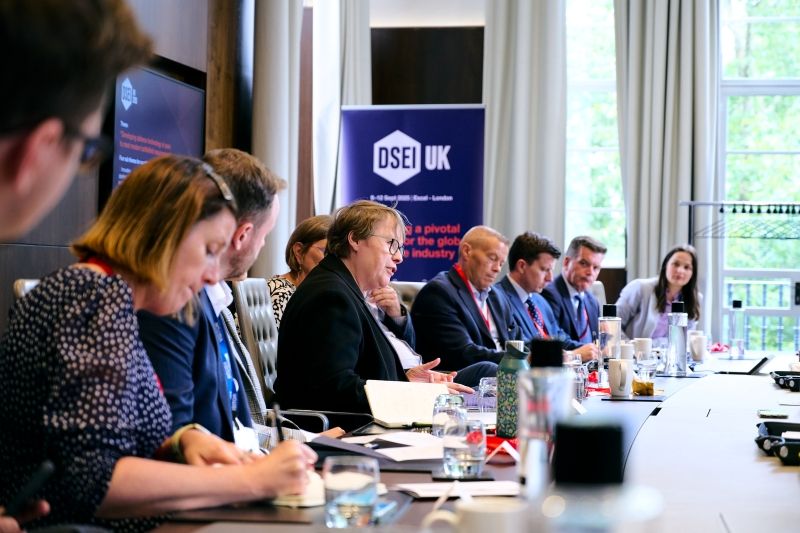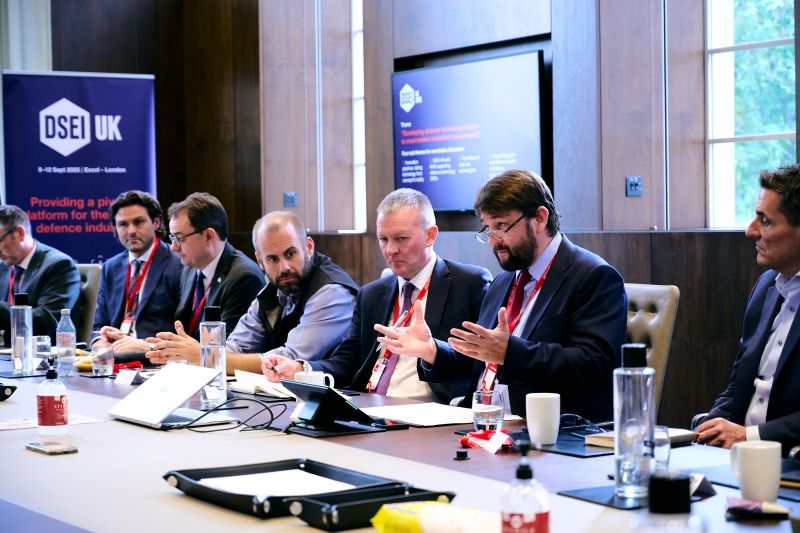DSEI UK: Tech leaders and MoD Minister Maria Eagle tackle UK defence innovation
- DSEI 2025
- Europe
- Interview

Tech leaders and the UK minister for defence procurement tackled what’s blocking innovation during a DSEI roundtable ahead of DSEI UK.
Blockages in the technology innovation pipeline and digital skills shortages were just some of the topics discussed by industry stakeholders during a DSEI-hosted roundtable held in July.
Chaired by the UK Minister for Defence Procurement, Maria Eagle, attendees included the likes of KX, Forcys, Dell, and Amazon Web Services, all of which are attending DSEI UK 2025.
The theme of the roundtable was ‘developing defence technology at pace to meet modern battlefield requirements’, a key theme at this year's DSEI UK. Under the banner of this overarching theme, four sub-themes were discussed by the group as company representatives directed questions and suggestions towards the minister.
The minister opened the proceedings by outlining the UK’s Ministry of Defence (MoD) priorities, calling the current moment a “pivotal” one for UK defence as the country looks to return to warfighting readiness.
Technology will be central to this move and the UK is set on becoming a leading “tech-enabled defence superpower by 2035”, she said, with priorities based on the lessons learned in Ukraine. Changes like these will require some changes in the governments approach to technology, though.
“We've got to innovate at the speed of technology … there's no point taking six years to get to contract on a drone – you'd just be contracting to put it in the museum”, she added.
Changing the way the UK Government acquires and utilises innovative defence technology at speed and scale will require stronger collaboration between government and industry, however, and there is still some way to go to ensure this relationship works according to industry stakeholders at the roundtable.
Bolstering the innovation pipeline
A major hurdle for defence firms is navigating the ‘valley of death’ – the time between developing an initial concept and the point at which the company starts to see returns on its investment. Businesses need considerable support to stay liquid and avoid bankruptcy in this period.
“I think part of the challenge that we've identified is taking an operational concept demonstrator, which we've been involved with in defence, and bringing that into core [military programmes]”, a representative from KX, a software company based in Northern Ireland, said.
“[It’s] the valley of death or the cup of opportunity, as I call it – and nobody seems to be drinking from that cup”, the representative said.
“A lot of attention goes to the SMEs [small and medium-sized enterprises] and the concept demonstration, and the primes get a huge amount of attention at the other end of the scale, but dragging those concept demonstrators into a core programme, that seems to be a key challenge, and it would be great to understand how that can be accelerated so that concepts don't just wither on the vine”.
Eagle recognised that concept demonstrators are sometimes shelved with “no follow up”, noting that the “valley of death has been a big problem”.
To address this, the UK is “establishing UK innovation”, with the goal of getting “new ideas and concepts, and new ways of doing things to the warfighter”.

Company representatives and moderator gathered at DSEI UK roundtable. (DSEI UK)
Is there enough support for SMEs?
Another portion of the roundtable focused on how SMEs position in the defence ecosystem can be further supported, particularly by other key stakeholders such as the UK MoD and DSEI UK.
Eagle noted the UK Government’s plans to establish an SME hub in the “not too distance future” to provide smaller defence tech companies with assistance for working in the sector and with the MoD.
A representative from Forcys welcomed plans to establish an SME hub but did push back against the minister, arguing that many of these initiatives designed to fund innovation do not come with “sufficient money”.
“The average DASA [Defence and Security Accelerator] award is GBP50,000 to GBP100,000 – its buttons to what's actually required to develop something at pace and really develop it properly, rather than just playing into it”, the representative argued.
The representative also rallied against the problems faced by Forcys due to its size, given its defined neither as an SME nor a prime. This means it doesn’t get the support infrastructure afforded to smaller firms, nor the advantages that come with having the scale of a prime.
The future of dual use and next-gen skills issues
Looking ahead, stakeholders at the roundtable also discussed what the future might look like for the defence industry, given the changing nature of dual-use technology and the concerning digital skills gaps in the sector.
Understanding the defence supply chain is crucial on the dual-use front, according to a representative from PQShield. They pointed to the untapped potential in dual-use, explaining that many companies don’t know how to sell to the defence industry.
“We're struggling to pitch it to defence right now because we don't know the best place to go”, the representative said, speaking about PQShield’s cryptography products and solutions.
Discussion also turned to the difficulties the defence industry faces in acquiring workers with the right skills or having access to graduates and those early in their careers.
“We're being outgunned by gaming, by fintech, by the finance industry – we're not getting the best people. We say we do, we don't because we just simply can't pay for them”, Rob Taylor, founder of training technology firm 4GD, said.
Adding to this point, the representative from KX said that they would like to see schools doing more to incentivise students to seek out technology jobs. A good approach would be to start from year seven or even younger, they said.
Eagle agreed that the skills issue is “tremendously important”, adding that the UK’s skills system has not worked as well as it could for some time and that many industries are suffering the same skills shortages.
“As we've had the last few years, where you've got a war on our doorstep and things like that going on, there's been a shift back towards understanding the value of defence. But there's some ways still to go, so we've got more work to do on that”, Eagle said.
DSEI Gateway News is part of DSEI UK and the broader Clarion Defence portfolio.
Enjoy reading this article? Click here to read more about our upcoming DSEI membership offering...
Tags
- ahead
- blocking
- company
- concept
- death
- defence
- dsei
- during
- eagle
- forcys
- industry
- innovation
- leaders
- maria
- minister
- mod
- procurement
- representative
- roundtable
- s
- skills
- stakeholders
- tackle
- tackled
- tech
- technology
- theme
- uk
- valley
- ve
Providing impartial insights and news on defence, focusing on actionable opportunities.
-
The RFI suggests there is a growing need in NATO to manage the sheer volumes of OSINT data being collected.
-
It comes as UK Space Command seeks to become “a more intelligent customer”.
-
Startups and small businesses are eligible to apply.


)
)
)
